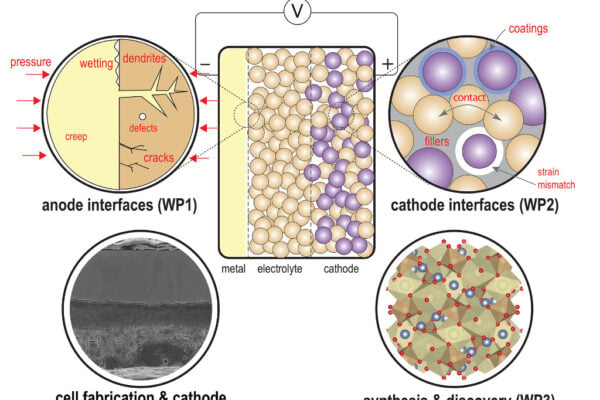
UK looks to catch up in solid-state batteries
A consortium of seven UK-based organisations has signed a memorandum of understanding to commercialise a prototype solid-state battery technology for automotive applications.
The consortium includes battery factory developer BritishVolt and material supplier Johnson Matthey with equipment maker E+R (Emerson & Renwick). The technology will come from research at the University of Oxford with development by the University of Warwick and the Warwick Manufacturing Group. Prototypes will be developed at the UK Battery Industrialisation Centre but “sSources of funding are currently being sought,” it says.
The consortium is led by the Faraday Institution, the UK’s independent institute for electrochemical energy storage research. Oxford University leads the Faraday Institution’s solid-state battery SOLBAT project and provides the necessary scientific understanding to the consortium.
This will be key for plans for a battery gigafactory in the UK by BritishVolt which broke ground last week as pilot lines are already being established around the world for the technology with production planned in 2022 for major car makers.
Related articles
- UK’s billion pound battery bet should look to solid state cells
- Stellantis bets €30bn on solid state batteries
- UK opens battery module and pack line
- BMW winning race to solid state battery electric car in 2022
- Sakuú teams for 3D printed solid state battery pilot line
- Britishvolt moves battery gigafactory plan to Northumberland
“Solid-state is the holy grail of battery solutions. Solid-state batteries have the potential to increase energy density significantly over battery technology available today and could dramatically, and positively, change the world of electric vehicles. Britishvolt will be at the forefront of commercialising this step change over the coming years,” said Dr Allan Paterson, Chief Technology Officer, Britishvolt. “This collaboration, which includes major global industrial leaders such as Johnson Matthey and academic leadership from University of Oxford, underscores another key objective in our technology roadmap – home grown intellectual property.”
“Our newly opened national battery manufacturing scale up facility is already contracted to scale new cells and battery packs by companies basing their manufacturing centres in the UK. It’s a really exciting time for this fast-growing industry. We’re scaling technologies that will be the core products of the UK’s emergent Gigafactories,” said Ian Whiting, Commercial Director at UKBIC. “But we need to think even further ahead and solid-state battery technology is going to be a big part of that. This collaboration is what is needed to give the UK the edge it needs in creating a centre of excellence for solid-state batteries and we’re excited to be part of it. The bringing together of academic and industrial know how in this space is key to unlocking Britain’s electrified potential.”
The preliminary design for a prototyping facility has been developed. “The realisation of a prototype solid-state battery cell will be a great achievement for the UK battery industry, and this consortium will be a critical enabler for delivering this milestone. Delivering enhanced range and safety over traditional lithium-ion battery technologies will be a key driver for battery electric vehicle adoption, supporting the transition to a net zero future,” said Christian Gunther, CEO, Battery Materials at Johnson Matthey.
Solid-state batteries (SSBs) offer significant potential advantages over existing lithium-ion battery technologies, including the ability to hold more charge for a given volume, leading to increased electric vehicle (EV) range and reduced costs of safety-management.
Next: Key opportuity for solid state battery supply chain
This is a key opportunity to leapfrog the current lithium ion battery technology for EVs.
“I am delighted to be able to announce the formation of this unique consortium for the advancement of solid-state battery prototyping that includes leading UK-based organisations at many stages in the value chain,” said Professor Pam Thomas, CEO of Faraday Institution. “Our leadership in this venture signals a move towards a role that the Faraday Institution will increasingly play as a trusted convener of significant partnerships between UK industry and academia as a route to commercialise breakthrough science emerging from our research programmes to maximise UK economic value.”
However, there are fundamental scientific challenges that need to be addressed before high power SSBs with commercially relevant performance can be realised. The Faraday Institution’s SOLBAT project has made considerable progress in addressing these challenges over the last three years.
The construction of the one-of-a-kind facility being developed by the collaboration will enable SSB technology to emerge from UK university laboratories. It will allow larger cells to be produced using scalable manufacturing techniques that will be improved iteratively through deep investigation of the causes of problems that emerge during manufacture and testing of prototype batteries. This will leverage the collective knowledge of Faraday Institution SSB researchers and the industrial partners.
Professor Peter Bruce, Principal Investigator of SOLBAT, comments: “It’s fantastic to see the culmination of combined UK academic strength in solid-state battery research come to fruition. I’m proud that the work of the Faraday Institution SOLBAT project, led by Oxford University, will make a significant contribution to the UK’s green energy revolution.”
David Greenwood, Professor of Advanced Propulsion Systems, and CEO of WMG High Value Manufacturing Catapult comments: “Early forms of solid-state battery are already around us, but we have yet to see solutions which are both mass-manufacturable and meet the performance and cost targets for future transport applications. There remains huge opportunity for innovation in this space, and this initiative will provide the route for the UK to fast-track candidate technologies to industrialisation.”
www.matthey.com; www.britishvolt.com
Other solid state battery articles
- €8m commercial solid state battery project for electric vehicles
- £25m for UK EV solid state battery production
- World’s first commercial solid state battery 3D printer
- Electrode design boost for solid state battery designs
- First four projects for UK’s Faraday battery technology
- Johnson Matthey teams for graphene battery materials
Other articles on eeNews Europe
- Intel shows engineering silicon of its biggest ever chip
- VE-Vides Project looks to trustworthy IP and verification
- How long has the semiconductor industry got?
- UK launches Serapis framework for space technology
 If you enjoyed this article, you will like the following ones: don't miss them by subscribing to :
eeNews on Google News
If you enjoyed this article, you will like the following ones: don't miss them by subscribing to :
eeNews on Google News


